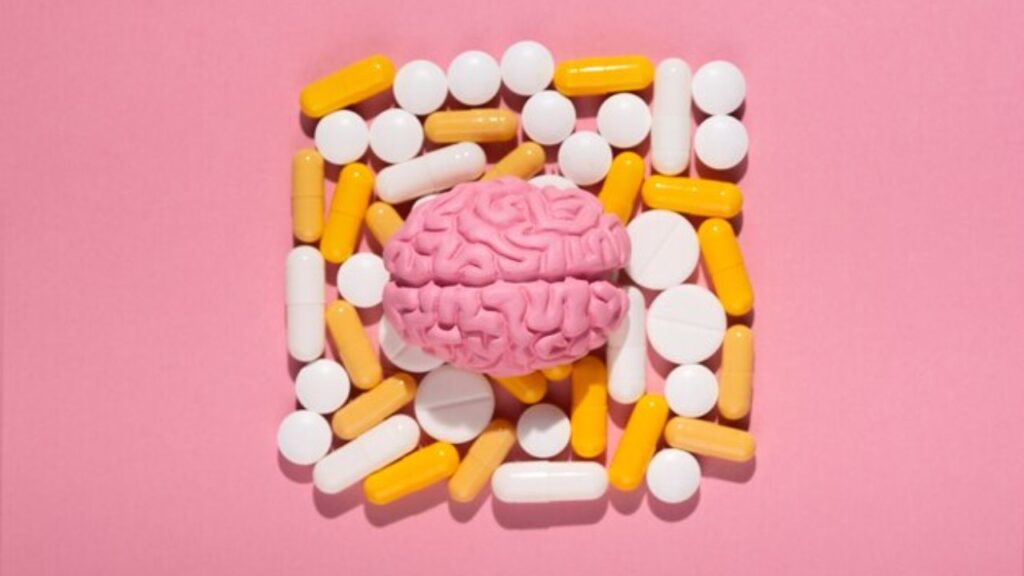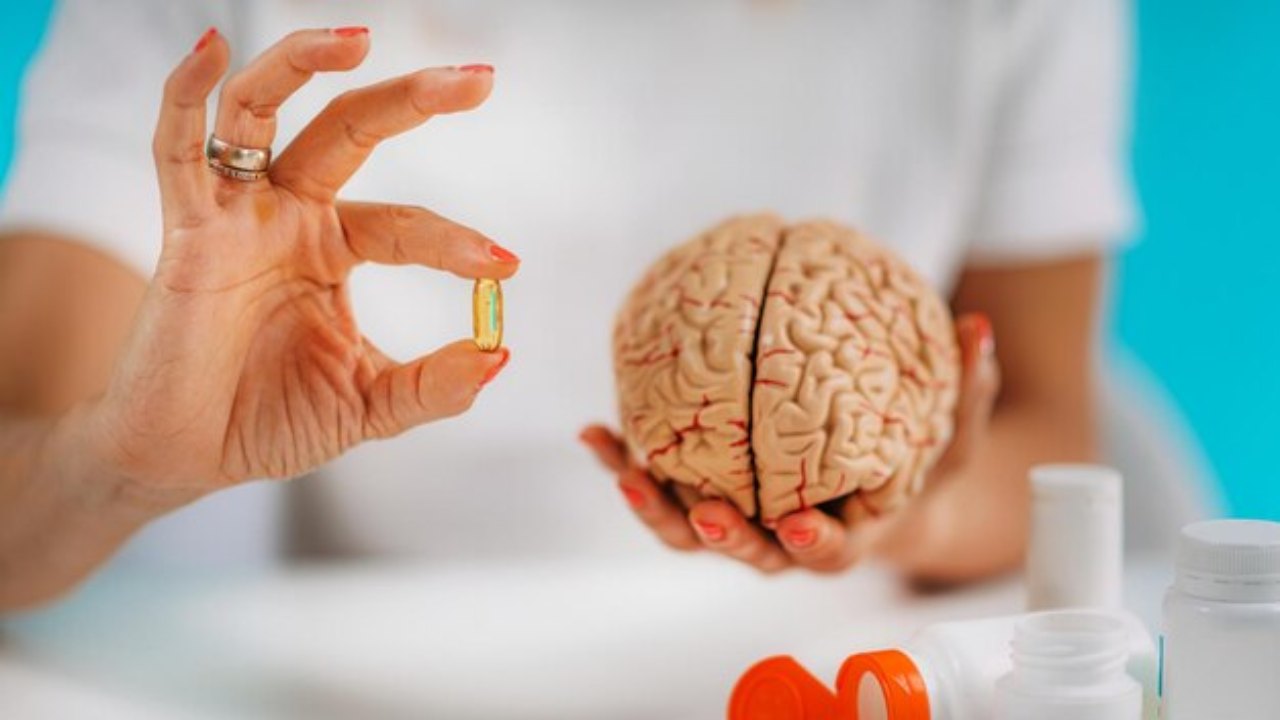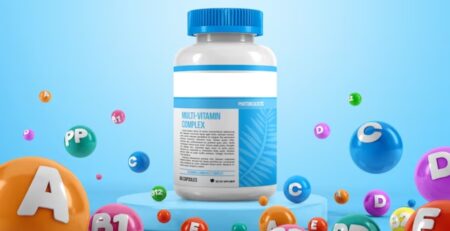Smart Feasts, Smart Minds: Nurturing Brain with 7 Brain-boosting Vitamins
Do you need vitamins for optimum brain health? Oh, yes, you need.
However, what vitamins are good for the brain? Though all vitamins are good for the brain, certain vital nutrients are crucial for brain development and function.
This blog post will enlighten you with the essential brain-boosting vitamins that may help you improve memory, focus, and cognitive function.
Do You Need Vitamins For Brain Development?
Vitamins support various aspects of brain health, including memory, cognition, and overall brain function. They play a critical role in the brain’s initial development and impact metabolism throughout life.
Specific vitamins are essential for developing a child’s brain as they influence early cognitive development. Studies show that vitamin deficiencies such as A, B12, D, and E can result in mental and neural developmental issues in children.
When a woman is pregnant, her body needs certain vitamins to help the baby grow and develop properly. These vitamins, such as folic acid, iron, vitamin D, vitamin C, vitamin B12, and others, help develop the baby’s bones, muscles, nerves, neural tube, teeth, and brain.
However, remember that taking too much vitamins can harm your health. So, only take vitamins under the guidance of a healthcare professional.
You can try VitaminMD’s Mind and Body Formulation, a research-developed and formulated vitamin pack to support your brain and mental health.
What Vitamins Are Good For The Brain?
Several other vitamins are good for brain health.
B Vitamins
B vitamins are a group of eight water-soluble vitamins crucial in cell functioning. They help in various chemical reactions in the body as coenzymes. Numerous studies suggest that taking all eight B vitamins may improve neurological functioning.
- Vitamin B1 (Thiamine): It supports brain function, neurotransmitter synthesis, and glucose metabolism. Thiamine deficiency can lead to cognitive and neurological disorders like Wernicke-Korsakoff syndrome.
- Vitamin B2 (Riboflavin): Riboflavin helps improve neurological conditions by addressing issues such as oxidative stress, mitochondrial dysfunction, neuroinflammation, and glutamate excitotoxicity. If you have migraines, adding vitamin B2 to your life might be a good choice.
- Vitamin B3 (Niacin): Niacin indeed has neuroprotective potential. It acts as an antioxidant and plays a role in cell signaling and DNA repair. It aids in memory retention and supports overall cognitive function. Some studies suggest that niacin could help maintain brain health for people with Alzheimer’s disease. However, more research is needed.
- Vitamin B5 (Pantothenic Acid): B5 vitamin works closely with other B vitamins to keep your brain healthy. It is a forerunner for the synthesis of acetyl-CoA, which is necessary for energy production and the creation of ATP. Besides, it influences neurotransmitters by supporting the production and maintenance of myelin sheath. Lack of Vitamin B5 can cause neural damage and Alzheimer’s disease.
- Vitamin B6 (Pyridoxine): It helps the body process protein, fat, and carbohydrates, as well as create red blood cells and neurotransmitters. By reducing homocysteine levels, which are linked to Alzheimer’s and memory problems, Vitamin B6 can help prevent a decline in brain function.
- Vitamin B9 (Folate): Vitamin B9 is crucial for brain and neurological health. It helps neurotransmitters function optimally and is vital for growth, brain development, and genetic material production. Consuming enough vitamin B9 may reduce the risk of poor memory recall, difficulty with verbal fluency, slow processing speed, decreased attention span, and working memory in older adults.
- Vitamin B12 (Cobalamin): If you want a healthy brain, have enough Vitamin B12 in your diet. It helps in the metabolism of cells in the body, especially in the production of energy and fatty acids and in the regulation and synthesis of DNA. Vitamin B12 immensely benefits brain development and function, including memory and cognitive function.
Recommended Dosage Of B Vitamins For Brain Health
Here are the recommended daily intakes for each B vitamin-
- Vitamin B1 (thiamine): 1.2 mg for men and 1.1 mg for women
- Vitamin B2 (riboflavin): 1.3 mg for men and 1.1 mg for women
- Vitamin B3 (niacin): 16 mg for men and 14 mg for women
- Vitamin B5 (pantothenic acid): 5 mg for both men and women
- Vitamin B6 (pyridoxine): 1.3-1.7 mg for adults
- Vitamin B9 (folate): 400-800 mcg for adults
- Vitamin B12 (cobalamin): 2.4 mcg for adults
Vitamin D
Vitamin D has several benefits for brain health, as it is a neurosteroid responsible for brain maturation, growth, and the stimulation of essential antioxidants in the brain. Some of the key benefits of vitamin D on brain health include:
- Neuroprotection: It helps maintain brain health and prevent cognitive decline.
- Regulation of Neurotransmitters and Neurotrophic Factors: Vitamin D affects the synthesis of neurotransmitters and neurotrophic factors necessary for brain function by activating and deactivating enzymes in the brain and cerebrospinal fluid.
- Cognitive Function: Studies suggest adequate vitamin D levels may help cognitive function, including improved memory and slower cognitive decline over time.
- Mental Well-Being: Vitamin D is necessary for calcium balance, skeletal integrity, and neurodevelopment. Its deficiency may lead to depression, dementia, autism, diabetes, and schizophrenia.
- Brain Development in Children: Vitamin D deficiency during pregnancy and early childhood may lead to impaired neurodevelopment, including cognitive delay and behavioral problems.
Recommended Dosage Of Vitamin D For Brain Health
The amount of vitamin D required for brain health varies depending on age, sex, and other factors. The recommended daily intake for most adults is 600-800 IU. However, higher doses may be required for optimal brain health benefits.
Omega-3 Fatty Acid
Omega-3 fatty acids, particularly eicosapentaenoic acid (EPA) and docosahexaenoic acid (DHA) are crucial in maintaining optimum brain function.
- Cognitive Function: Omega-3 fatty acids are essential for normal brain function and development. They may improve cognitive function, including memory and learning. Research suggests that lower levels of DHA in red blood cells are linked with smaller brain size and cognitive difficulties with a “vascular” pattern.
- Neuroprotection: DHA is crucial for the structure and function of brain cell membranes. It has neuroprotective properties and may help reduce the risk of neurodegenerative diseases.
- Brain Development: Omega-3 is essential for brain and eye development. It also supports mental health in adulthood by keeping brain cells flexible and fluid.
- Mood and Mental Health: Omega-3 fatty acids, specifically eicosapentaenoic acid (EPA), possess potent anti-inflammatory properties that have demonstrated efficacy in treating and preventing depression. Moreover, these compounds may have beneficial effects on mood and mental health.
Recommended Dosage Of Omega-3 Fatty Acids For Brain Health
The recommended daily intake of omega-3s from fish oil is usually 1,000–2,000 mg, providing essential EPA and DHA fatty acids vital for normal brain function. However, consult a healthcare professional first, as fish oil supplements can affect blood clotting.
Vitamin C
Vitamin C protects brain cells as an antioxidant and helps with neuronal differentiation, maturation, modulation of brain systems, and many others.
Here are the benefits of vitamin C for brain health.
- Antioxidant Protection: Vitamin C is a powerful antioxidant in the brain, neutralizing free radicals and protecting brain cells.
- Neurotransmitter Synthesis: Vitamin C helps synthesize neurotransmitters like serotonin and norepinephrine and converts dopamine to norepinephrine. It can affect mood, emotions, and cognitive processes related to attention and focus.
- Myelin Formation: Vitamin C is involved in myelin formation that surrounds many neuronal processes. It is crucial for the function of the nervous system.
- Neuron Energy Regulation: It regulates neuron energy, supporting optimal brain function
- Protection Against Neurodegenerative Diseases: Vitamin C protects nerve cells and blood vessels in the brain, protecting against neurodegenerative diseases.
- Cognitive Function: Research has shown that vitamin C may prevent cognitive decline, enhance hippocampal function, and improve memory.
Recommended Dosage Of Vitamin C For Brain Health
Most adults need around 75-90 mg of vitamin C daily, depending on gender. Taking too much vitamin C may not benefit brain health as the body may be unable to use the excess, which could be excreted.
Vitamin A
Vitamin A plays a significant role in brain health, with several benefits for cognitive function and brain development.
- Neurogenesis and Neuronal Patterning: Vitamin A and its derivatives, the retinoids, are essential for the developing central nervous system. They control neurogenesis and neuronal patterning, crucial processes in nervous system formation.
- Cognitive Function: Vitamin A supports the regulation of brain plasticity, particularly in promoting new nerve cell growth in the hippocampus, the brain region responsible for learning and memory. This intricate process of hippocampal neurogenesis is closely tied to various cognitive functions and is critical in shaping your ability to learn and retain information.
- Neurotransmitter Regulation: Vitamin A derivatives are involved in a complex signaling pathway. They regulate gene expression and control neuronal differentiation in the central nervous system, which has functional implications for learning and memory.
Recommended Dosage Of Vitamin A For Brain Health
Daily vitamin A intake recommendations vary by age and gender. Women need 700-900 mcg RAE, and men need 900-1000 mcg RAE. Children aged 1-3 should not exceed 600 mcg RAE per day, and children aged 4-8 should not exceed 900 mcg RAE per day.
Vitamin E
Vitamin E is crucial to brain health due to its antioxidant effects.
- Neuroprotective Properties: Vitamin E is neuroprotective and improves brain blood flow, allowing it to receive more oxygen and nutrients. It may help prevent neurodegeneration, particularly in Alzheimer’s disease. Studies suggest higher Vitamin E levels are linked to better cognitive function in aging, dementia, and Alzheimer’s disease.
- Antioxidant Effects: Vitamin E protects brain cells from damage caused by free radicals, which is crucial due to the brain’s high fatty acid content and low antioxidant levels.
- Cognitive Performance: Oxidative stress is harmful to the brain and a consistent risk factor for Alzheimer’s disease. Vitamin E can help protect the brain by reducing oxidative stress and promoting cognitive function.
- Managing DHA Acquire And Use: New research shows that vitamin E regulates the brain’s DHA utilization. DHA becomes DHA-PC in the brain and is critical for neuron membranes. Loss of membrane integrity impairs neuron function.
Recommended Dosage Of Vitamin E For Brain Health

The recommended daily allowance (RDA) for vitamin E in adults is 15 milligrams (22.4 IU) of alpha-tocopherol. The daily dosage of vitamin E for children depends on their age.
- Children aged 1-3 years: 6 mg (9 IU)
- Children aged 4-8 years: 7 mg (10.4 IU)
- Children aged 9-13 years: 11 mg (16.4 IU)
- Adolescents aged 14-18 years: 15 mg (22.4 IU)
Magnesium
Magnesium is crucial for brain health and may protect against neurological disorders. Let’s explore its role in brain health.
- Neurotransmitter Regulation: Magnesium is vital for the proper function of neurons and helps to regulate neurotransmitters. These chemical messengers help the cells in your brain communicate with each other and the rest of your body.
- Neuroprotection: Magnesium protects brain cells from damage caused by over-excitement and may lead to neurological disorders. Scientists are exploring its potential neuroprotective role.
- Counteracting Oxidative Stress: Magnesium in the brain counteracts oxidative stress and inhibits the release of vasoactive molecules, contributing to preserving brain health.
- Cognitive Function: Magnesium is essential for healthy brain and nervous system function. It protects against neurological and psychiatric disorders.
Recommended Dosage Of Magnesium For Brain Health
The appropriate magnesium dosage for brain health depends on your needs and health conditions. The RDA for magnesium is 80-240 mg daily for ages 1-13. Recommended magnesium supplements are 200-400 mg per day, and the upper limit is 350 mg per day.
Bottom Line
What vitamins are good for the brain? B vitamins, vitamins A, C, D, E, Omega-3 fatty acids, and magnesium. These seven vitamins promote brain development, memory, hearing, and cognition while preventing neurological disorders.
If you’re looking for vitamins to boost your brain, try Dr. Nazarian’s Vitamin MD elixir. It can enhance brain health, focus, memory, and cognitive performance.












Leave a Reply